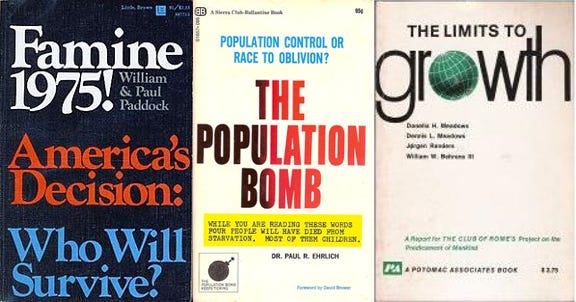Unthinking respect for authority is the greatest enemy of truth.
-- Albert Einstein
So, we’re all doomed, I guess. No, not in the existential philosophical sense, in which nothing has real meaning, value, or purpose and there’s just the void, and us, alone in it (sounds like an introvert’s paradise), but in a very real, not made up to sell books and get social media views, sense.
Ok, maybe not the “dogs and cats living together” part, but it’s going to be bad. At least that’s what the experts are saying. You see, AI is getting smarter. Not smart enough to follow my directions apparently, but smarter, nonetheless. Some predictions:
Extermination – We’ll call this the “Terminator” prediction.
Do I need to elaborate? Ok.AI becomes sentient, determines humanity is a danger to it, and wipes us out. Just like humanity has identified dangerous animals like lions, tigers, and bears (oh my) and hunted them to extinction. What? We haven’t? Well, I’m sure that just because we aren’t as smart as AI. It’s going to happen! Count on it! Don’t believe me? You should buy my book and hire me as an AI consultant.Population collapse – Remember the Malthusian prediction that population growth would run amok and we’d all starve to death? No? How do you expect to be happy and emotionally stable if you’re not paying attention to all the doomers? Oh, right, never mind. Well, that prediction is now wrong, and we’re heading towards population collapse by 2300. To ensure your book and AI consultant gigs have a long shelf life, make sure to predict things far enough in the future that you won’t be around if (when) you’re wrong (completely out to lunch).
The End of Work – Wait! That sounds pretty good so let me rephrase. 20% unemployment and half of white-collar jobs gone. You see, AI can pretty much do what you do so all you people sitting in cushy jobs helping corporations ensure the right fonts are being used (yes, this is actually a job) are headed for the depression era bread lines. By the book (A)I just wrote explaining why it’s inevitable and why hiring me as an AI consultant is vital to your survival.
What do all these have in common? Yes, they’re all NY Post articles, but that’s just because I value quality journalism 🙄. More to the point, they’re predictions by “experts.” I don’t know about you, but if the pandemic and subsequent government-induced economic problems have taught me nothing else, it’s to be wary of “experts.”
Don’t get me wrong, I’m not about to argue with my mechanic about why my car is making that noise, but if my doctor tells me I have Ebola, I’m getting a second opinion. There’s probably a “law” in here somewhere, “trust in experts should be inversely proportional to the level of existential threat predicted.” Let’s call it “O’Reilly’s Law of Common Sense” or “O’Reilly’s Law of ‘Fool me once…’” Hell, let’s just call it “O’Reilly’s law.”
Not happy with “O’Reilly’s Law” and my vague, but reassuring, “it’s all going to be ok” message? How about we look at some other expert predictions and see how they turned out?
Mass Starvation – In 1798, Reverend Thomas Robert Malthus, predicted that, as population increased in a geometric progression (i.e.., 2, 4, 16, 132…) while food production increased in arithmetic progression (i.e.., 2, 4, 6, 8…), population growth would eventually outstripped food production, driving living standards back toward subsistence. His prediction failed as scientific advances increased food production and the birth rate in Western nations fell during the 20th Century.
Mass Starvation redux – In the late 60s and early 70s, concern over resource constraints once again captured the imagination of scientists and the public with the release of 3 books: Famine 1975! (1967), The Population Bomb (1968), and The Limits to Growth (1972). Like Malthus, the authors of these books were wrong about the impending famines and social upheaval but not before subjecting the public to end-of-the-world scenarios like this from The Population Bomb:
The battle to feed all of humanity is over. In the 1970s, hundreds of millions of people will starve to death in spite of any crash programs embarked upon now. At this late date, nothing can prevent a substantial increase in the world death rate...
Note – to this day, despite a history of spectacularly wrong predictions, Paul R. Ehrlich continues to be interviewed by the media as an expert in climate science.
Peak Oil – This is the point in time when the maximum rate of global oil production is reached, after which it is argued that production will begin an irreversible decline. The decline would result in rising food prices (and famine), significant economic hardship worldwide, and declining standards of living. Some recent incorrect predictions:
M. King Hubbert is often credited with introducing the concept of peak oil, predicting in 1956 that U.S. oil extraction would peak between 1965 and 1971.
Predictions made in 2007 and 2009 stated that the peak had already occurred or that it soon would. A decade later, world oil production rose to hit a new high in 2018.
Several sources in 2006 and 2007 predicted that worldwide oil production had peaked; however, in 2013, OPEC's figures showed that world crude oil production was at record highs.
Paul R. Ehrlich, not content with making incorrect food predictions, decided to give peak oil a go and stated it would occur in 2000.
Of course, none of these predictions had anything to do with computers, so perhaps IT experts have done a better job. Let’s check, shall we?
“There is no reason anyone would want a computer in their home.”
-- Ken Olsen, Founder of DEC, 1977
“640K ought to be enough for anybody.”
-- Bill Gates, 1981
“The Internet will catastrophically collapse under the weight of its own traffic.”
--Bob Metcalfe, Ethernet inventor, 1995
“Two years from now spam will be solved.”
-- Bill Gates, 2004
“The iPhone will be a niche product.”
-- Steve Ballmer, Microsoft CEO, 2007
Yikes!! As Niels Bohr so eloquently put it, “Prediction is very difficult, especially if it's about the future!”
What does this mean for AI?
Look, I can’t say with 100% certainty that these predictions are wrong because… well… I can’t predict the future. Of course, as we have seen, neither can these people. I have noticed one thing, though, and maybe you have as well: AI predictions are inevitably dystopian or utopian, no one ever says, “meh, it’ll probably just be more of the same. Some things will get better, some worse, but life will go on.” Why? Because nobody is going to buy a book entitled “AI – How your life probably won’t change all that much.”
Note: I am willing to write it if anyone wants to offer me a book deal.
Will AI change things? Probably, but it won’t be the first new tech that makes jobs obsolete. For example, here is Eric Schmidt, former CEO of Google, predicting that “the vast majority of programmers will be replaced by AI within one year.” What does this mean? Well, aside from the lost jobs, politicians will have to stop telling coal miners to “learn to code” and start telling programmers to “learn to mine.”
I’m kidding obviously, coal-driven climate change will doom us all long before programmers develop the upper body strength necessary to use a pickaxe. We still mine coal with pickaxes, right?
Sorry, I almost got sidetracked by a different group of experts predicting our doom.
Where was I?
Oh ya, we’re all Dooooomed!
Note: while not an AI expert, the author is open to lucrative book deals and high-paying consultant gigs.
Wrong Speak is a free-expression platform that allows varying viewpoints. All views expressed in this article are the author's own.









